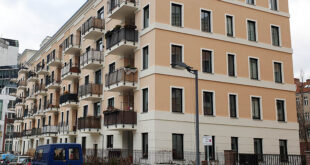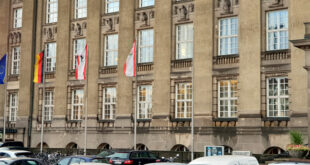Germany’s Minister of State for Migration, Refugees and Integration has said there should be more police officers, teachers and public administrative staff with a migration history. A new study, meanwhile, highlights institutional racism at German authorities. Benjamin Bathke reports.
“We need more diversity in order to do away with prejudices on both sides and make authorities more aware of immigrants’ needs,” Minister of State for Migration, Refugees and Integration, Reem Alabali-Radovan, told the Rheinische Post newspaper on Thursday (17 February).
The government should lead the way and implement more conscious hiring processes, Ms Alabali-Radovan argued.
However, the state minister said she was skeptical when it comes to a binding migration quota — a rule that would require institutions to hire a specific percentage of immigrants or people from immigrant families. “I’d be careful with that,” the 31-year-old daughter of Iraqi parents told the Rheinische Post. Instead, she advocated for exhausting existing possibilities first as there was room for improvement.
‘People with a migration background’ (Menschen mit Migrationshintergrund) make up roughly a quarter of Germany’s population. According to Alabali-Radovan, police, schools and municipalities need to reflect this reality better. The federal government will present a diversity strategy, she added.
A person is considered to have a migration background if they, or at least one of their parents, was born without German citizenship. Politicians and academics have argued about the term for years.
A related report about institutional racism found there were racist views still being held by German authorities, leading to serious consequences for migrants with regards to job placement, health care and police controls. The authors conducted interviews in different federal states with senior police, job center and local health authority staff.
According to the report, published on Wednesday (16 February) by the University of Duisburg Essen, racist notions — including the belief in stigmatizing stereotypes — are common in German authorities. “They are structurally embedded and are institutionally (re)produced,” the authors wrote.
Police officers, for instance, were using racial profiling — targetting people as suspects based on categories like religion (‘Muslims’) or nationality (‘Lebanese’) or skin colour rather than on individual suspicion. Police also often weren’t equipped to deal with non-German-speaking people seeking help — leaving these people without help unless they were able to find an interpreter on their own.
© InfoMigrants
 THE AFRICAN COURIER. Reporting Africa and its Diaspora! The African Courier is an international magazine published in Germany to report on Africa and the Diaspora African experience. The first issue of the bimonthly magazine appeared on the newsstands on 15 February 1998. The African Courier is a communication forum for European-African political, economic and cultural exchanges, and a voice for Africa in Europe.
THE AFRICAN COURIER. Reporting Africa and its Diaspora! The African Courier is an international magazine published in Germany to report on Africa and the Diaspora African experience. The first issue of the bimonthly magazine appeared on the newsstands on 15 February 1998. The African Courier is a communication forum for European-African political, economic and cultural exchanges, and a voice for Africa in Europe.



































